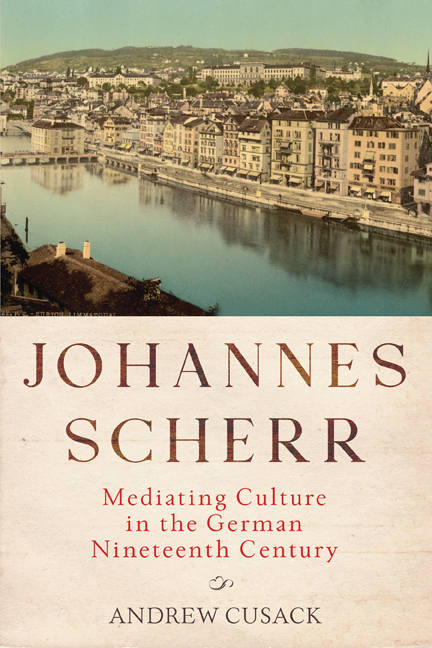Book contents
- Frontmatter
- Contents
- Acknowledgments
- Note on Translations and the Use of German Texts
- Introduction: The Success and Failure of Johannes Scherr
- 1 Scherr’s Liminality: Between Nations and Academic Cultures
- 2 The Cultural Historian as Mediator
- 3 Worlding German Literature
- 4 Weltschmerz and Pessimism—Scherr’s Old-Age Style
- Conclusion: Where Next for Scherr?
- Appendix: Overview of Essays in the Menschliche Tragikomödie
- Notes
- Bibliography
- Index
3 - Worlding German Literature
Published online by Cambridge University Press: 23 March 2021
- Frontmatter
- Contents
- Acknowledgments
- Note on Translations and the Use of German Texts
- Introduction: The Success and Failure of Johannes Scherr
- 1 Scherr’s Liminality: Between Nations and Academic Cultures
- 2 The Cultural Historian as Mediator
- 3 Worlding German Literature
- 4 Weltschmerz and Pessimism—Scherr’s Old-Age Style
- Conclusion: Where Next for Scherr?
- Appendix: Overview of Essays in the Menschliche Tragikomödie
- Notes
- Bibliography
- Index
Summary
JOHANNES SCHERR WAS the single most significant contributor to the “worlding” of German literature in the nineteenth century via a world literature project comprising three works: the Poeten der Jetztzeit of 1844, the Bildersaal der Weltliteratur of 1848, and the Allgemeine Geschichte der Literatur, published in 1851. A decade after Djelal Kadir suggested that comparatists take the word “world” as verb in order to reveal the subject agencies constituting such apparently “anonymous phenomena” as world literature, the term “worlding” has gained some currency in German studies. I wish to adopt the term here, because it affords a sharper view of Scherr's agency in the construction of his world literature project, of the motives underpinning that work—motives that changed across the biographical and political caesura of 1849—and of the effects of the exercise of that agency for Scherr's readers.
As we shall see, Scherr's world literature project is itself underpinned by a theory of geographically and historically situated agency, or at least by a set of fairly self-consistent, stable, and widely understood assumptions about national character. Character is the unifying theme of the world literature project. Anthologies (like the Bildersaal) and histories of world literature (like the Allgemeine Geschichte der Literatur) presuppose the existence of national characters. Indeed, they are motivated by the assumptions that national characters differ and that these differences are a matter of interest and importance.
Literature was regarded in the nineteenth century as the privileged medium for the expression of a nation's mind (Geist). Scherr also takes this view, defining literature as “die Gesamtheit der in Sprache, Schrift und Druck vorhandenen Geisteserzeugnisse” (the sum total of all those intellectual products available in language, writing and print). Geist is of course not static but is subject to historical change and development—one thinks of Hegel's absoluter Geist. It's a near synonym of Kultur, a term used to denote an emerging, all-embracing context.
- Type
- Chapter
- Information
- Johannes ScherrMediating Culture in the German Nineteenth Century, pp. 82 - 118Publisher: Boydell & BrewerPrint publication year: 2021



